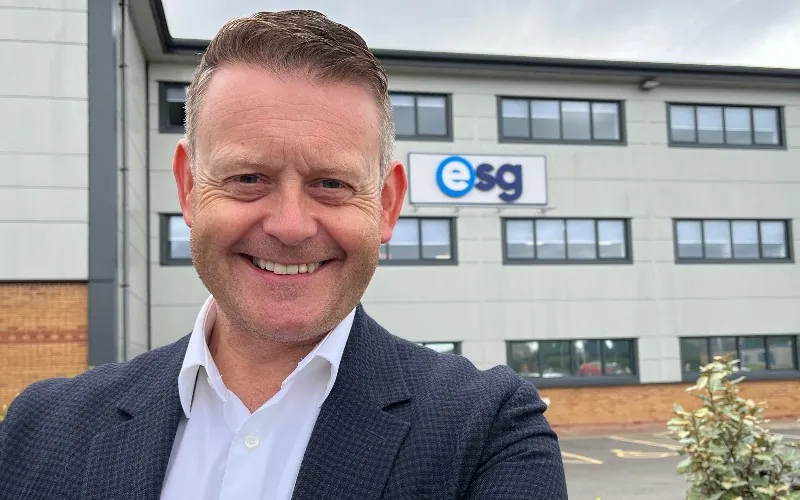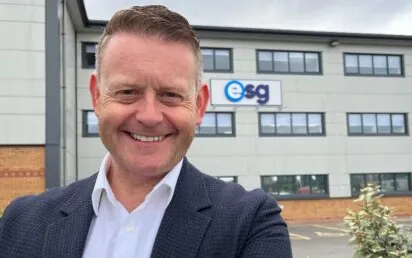For a man who doesn’t seek publicity, Matthew Hirst has an uncanny knack of making headlines.
He first gained prominence in 2014 when he successfully led a management buyout of energy technology provider Utiligroup from Bglobal plc with the backing of NorthEdge Capital.
Under his leadership the company’s valuation soared from £16m to around £100m in less than three years as revenues increased five-fold to over £20m.
In 2016 Hirst won an EY Entrepreneur of the Year Award for the North and by 2017 NorthEdge sold Utiligroup to Energy Services Group (ESG), which is part of the US private equity firm Accel-KKR’s portfolio.
When Utiligroup rebranded as ESG, Hirst became global CEO in 2020 and has overseen 10 acquisitions and now has 750 staff across Europe and North America, with offices in Chorley, Boston, Denver, Calgary, Houston and Copenhagen.
It’s the sort of growth that attracts headlines and modest Hirst has largely been content with letting the company’s stellar growth do the talking for him.
However, the father-of-two has marked his 25th anniversary of working in the energy market by giving a rare insight into his rise from marketing manager to global CEO of an energy giant.
His parents were both teachers and he went to Wardle High School in Rochdale, before graduating in business at The University of Salford.
He then landed a coveted role as marketing manager at ICL – before leaving to begin his life-long love affair with the energy industry.
Aged just 22 he decided to take a marketing manager’s role at a relatively unknown Blackburn-based firm called Formfill.
Hirst said: “There were a few raised eyebrows at the time but you have to follow your instinct. It was one of the best decisions I ever made.”
Formfill had developed a method of capturing data from forms and making it electronic but the game-changer was the deregulation of the electricity industry in 1997.
Clients found they needed a method of handling the dataflows when customers changed suppliers and Formfill secured a 95 per cent penetration of the country’s electric supply companies.
For the young Hirst it was an early lesson in how technology could simplify a complex industry like energy.
In 2007 Formfill changed its name to Utilisoft and then Utiligroup, which became the leading data management software provider to UK energy market participants.
Hirst’s meteoric rise up through the ranks saw him go from marketing manager, to sales director, to managing director and eventually CEO of Utiligroup in 2014, which was part of Bglobal plc.
Bglobal was essentially a smart meter installation business while Utiligroup was an energy software provider to energy suppliers. Although they both operated in the energy sector they were unlikely bedfellows.
By 2014 Bglobal was looking to sell their business divisions and Utiligroup, which employed 50 people and had a turnover of £4m, was an obvious asset.
Hirst said: “I saw a real opportunity to help digitise the energy market and to help some of the new entrants in the market become established. We’d been instrumental in helping the likes of OVO Energy and Octopus Energy to enter the market.”
In 2014 Hirst was 36 and, along with his friend and COO Drew Green, decided if they didn’t do a management buyout then they’d spend the rest of their lives regretting it.
“It was a now or never moment,” he recalled. “We threw our hat in the ring. We could see a massive opportunity for us and our business. We could buy it and grow it. We wanted to be the master of our own destiny.
“If they’d sold us we could have ended up anywhere. We would have probably gone back into the corporate world.”
Hirst approached the corporate finance world and NorthEdge Capital came on board, investing £11.1m of the £16m, with the remainder being bank debt.
“I had to invest everything I had and future bonuses,” said Hirst. “They call it ‘hurt money’. This was my big moment. I didn’t want to look back in 10 years’ time and think I had this opportunity and missed it. I was 100 per cent tied to the future success of Utiligroup. That was a big incentive.
“We were determined we could pull off this MBO. Of course, we were instrumental to the company being sold so quickly emerged as the most likely purchaser to deliver.”
Hirst praised the support provided of Martin Evans, who was one of the original founders of Formfill.
“It used to really irritate me when Martin called it the ‘management buyout idea’,” recalled Hirst with a smile.
“When Martin dropped the ‘idea’ bit and called it the ‘management buyout’ that gave me real confidence.
“We had a sense of the unknown. We’d never run a company like this in private equity.
“I had a great chairman alongside me in Ian Kelly, who’d held several private equity roles and was a fantastic mentor to me. We got off to a great start because we believed in what we were doing. In the space of three years we went from a £16m valuation to a £100m valuation. We grew revenues from £4m to over £20m.
“We expanded our software because we recognised the world was going digital and we were trying to come up with solutions for our customers. We forged a reputation for coming up with solutions to complex problems.”
Utiligroup crucially switched to become a SaaS-based business, allowing customers to pay via a subscription.
The company’s software helped smaller utility companies compete with the so-called ‘Big Six’ – British Gas, SSE, ScottishPower, EDF Energy, Eon and Npower – who suddenly realised they needed to work with Utiligroup.
Utiligroup also benefited from the implementation of the smart meter roll-out, whereby traditional energy meters were replaced with smart meters in homes and small businesses.
“We could see the smart meter roll-out had to happen,” he said. “It was government mandated. There were delays but we invested ahead of time in the software that energy suppliers would need to link billing systems to the new smart meters in real-time.
“We invested heavily in that period of time and became very credible, very quickly. We’ve now got more than 11 million connected smart meters in real-time in the UK.
In 2017 Energy Services Group (ESG) acquired Utiligroup, with the support of US private equity firm Accel-KKR.
More than 60 parties expressed an interest in investing in Utiligroup and Hirst said at the time the deal would help the company achieve its target to grow to 500 staff and a £50m turnover in three years.
Hirst was so convinced by the opportunity he rolled over a significant amount of his own money into the new business and was promoted to global CEO in 2020.
His promotion came just a few months after the Covid pandemic struck and one of his first jobs was to come up with a global strategy.
“The problems we were solving in the US were similar to the problems in the UK,” he said. “We were doing things twice rather than doing things once.
“I became CEO with a global plan to develop software once and use it in all the markets that we operate in and start acquiring other businesses.
“We build tools that help our customers win for theirs. When their customers get clearer bills, smoother onboarding or faster smart mater updates – that’s the result we care about.
They’ve now acquired 10 businesses, including CUBS, in Denmark, which is the leading provider of billing solutions for energy companies and electric mobility providers.
ESG works with major multi-national energy providers like ENGIE and Shell, managing over 11 million meter points in the UK and 55 million globally.
Hirst mainly works out of the company’s Chorley headquarters but likes to regularly visit ESG’s other offices in Boston, Denver, Calgary, Houston and Copenhagen.
He has a reputation for being approachable and the one thing Hirst isn’t short of is energy, evidenced by his recent decision to become the chair of Inspire Youth Zone in Chorley.
“When I got into energy 25 years ago the energy market was starting to get exciting but nothing like we have now,” he said. “We can simplify complexity for our clients and the amount of technology we have now is amazing. The opportunities are huge and I’ve never been more excited.”


